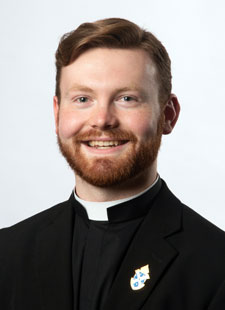Official Website of the
Catholic Diocese of Little Rock
Letters from Seminary: Thomas
Faith isn’t feeling sure any more than love is feeling attraction
Published: July 29, 2023
By Quinton Thomas
Diocesan Seminarian
Too often, Christian love is idealized. What about when the going gets tough? Then, love calls for faithfulness. I decided once to go split wood in our wood chop at St. Meinrad. Spoiler alert: It was a disaster! My aim was awful, my strikes were weak, and 50 bad hits on a single log had me asking which of us would break first.
 Turns out chopping wood calls for perseverance; faithfulness. And that’s how love goes, isn’t it? I start out with great intentions and bright-eyed idealism, but then the realities of life set in. I come across a really tough log. I want to do good, but there’s some unforeseen difficulty. Or somewhere along the way I lose my conviction.
Turns out chopping wood calls for perseverance; faithfulness. And that’s how love goes, isn’t it? I start out with great intentions and bright-eyed idealism, but then the realities of life set in. I come across a really tough log. I want to do good, but there’s some unforeseen difficulty. Or somewhere along the way I lose my conviction.
How do I love when my will to love has left me? All people, regardless of our vocations, are called to be faithful to God and others despite difficulties. God calls me to be faithful to developing a priestly heart, even (especially) those days when I feel the weight of that call and doubt my willingness to carry it.
Faith isn’t feeling sure any more than love is feeling attraction. Our feelings don’t believe or love; we do. Time after time, we must choose whether to believe and love, often despite our feelings. Faithfulness does not depend on a feeling, but a choice.
Folks outside this vocation are called to be faithful to a spouse or children or another ministry, particularly when those people seem most difficult to love.
And all of us are called to be faithful in the little difficulties, like tedious household chores. Not to give up, but to chop away, tired and frustrated, until the chopping’s done.
In this conundrum of our condition, we have a uniquely human difficulty and opportunity. Between animals incapable of informed choices and angels so intelligent they can’t change their minds like we humans, with our limited sight and characteristically fickle will. We must choose — we may choose — over and over again.
Yet, that is faith! Choosing to believe despite not seeing. In the end, we won’t have faith because we will know. But on this side of the veil, where vision is blurry, we only catch glimpses and must choose what to believe about the rest.
Faith isn’t feeling sure any more than love is feeling attraction. Our feelings don’t believe or love; we do. Time after time, we must choose whether to believe and love, often despite our feelings. Faithfulness does not depend on a feeling, but a choice.
Like newborn fawns just trying out their legs, or a wimpy seminarian trying to chop wood, we may still be wobbly when it comes to choosing the good. But over time, after repeated choice, we can develop the habit, the muscle and muscle memory. Unlike animals and angels, our good fortune is the chance to choose anew every day. If yesterday we chose poorly, we can choose right today, and if we chose right yesterday, today we can become faithful.
What exactly are we choosing? Not ideals, but the person of Jesus himself. We are faithful or unfaithful to Jesus, to his beautiful face. The good news for us is that his wounds show he already loves and is faithful to us. Loving us drove Jesus to the terrible difficulty of the cross, but steadfast he endured it. His faithfulness makes us able to endure the difficulties we encounter and to remain faithful to him, one chop at a time, until he says, “Well done, my good and faithful servant!”




